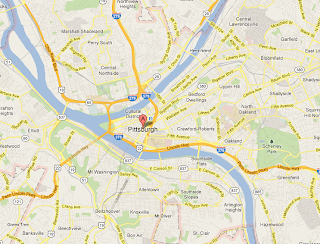While my biggest complaints involve the crowds and the sensory overload, I don't think I'd like the cities even if we were the only two people in one of them. An empty city is still a city.
I've written on this site several times about the problems I had living in Minneapolis, an older city with narrow roads and a cluttered, illogical downtown. The cramped nature of older cities is too much for me. The traffic, public transit, and tall buildings add to my anxiety.
Historically, the cities on the East coast evolved "organically" over the decades and centuries. Walking paths became wagon ways, which became roads. The streets of cities were shaped by geography, too, with roads going around hills and avoiding other obstacles. In the rare instances cities do have grid patterns, the grids are only a few blocks. Forget trying to navigate with the assumption that some roads are North-South and others run East-West. No, the roads just happened.
Below is a map of Pittsburgh. It is a map from Hell. Trust me, Mephistopheles would get lost trying to locate the financial district in Pittsburgh. Even when you can see the tall buildings, you can't drive in a straight line towards them. Recently, my wife and I were headed to the Bloomfield neighborhood to meet friends for dinner. A construction zone forced us to veer onto something like a highway, but not quite, and we ended up right back across the river near Mt. Washington. GPS was useless, since roads twist and turn faster than you can read the map. Good luck finding a city map anymore — first you'd have to find a decent bookstore or retailer with maps.
I hate the disorder. I despise it.
Compare Pittsburgh to Fresno, California. Notice the nice, perfect grids. You can drive along Shaw Avenue from State Highway 99 across Fresno and into Clovis, right past Fresno State. It's a straight line that crosses other straight lines. There are breaks in the grid and a few winding roads, but the major arteries are organized. This reflects the open, flat lands of the West. The cities were and are planned. Even new developments follow grids, or at least the commercial districts are on grids.
When I visit cities, I find that I like the cities that are organized. I like open spaces, too. This means I like the cities of the West — the "new" cities. San Francisco, with all its hills and strange traffic patterns, is still a grid. Los Angeles isn't quite a grid, but the major streets do at least attempt to be something of a grid pattern. Order matters to me. Simply looking at a map, I know if I'll be okay in a city. Not great, of course, but will be "okay enough" in a city with a grid.


Have you been to Chicago? Thanks to Mr. Burnham, we are on the grid--have been since the rebuilding of the city and the Columbia Exposition. But traffic here is just horrible and the drivers are top 5 rudest in the country.
ReplyDelete